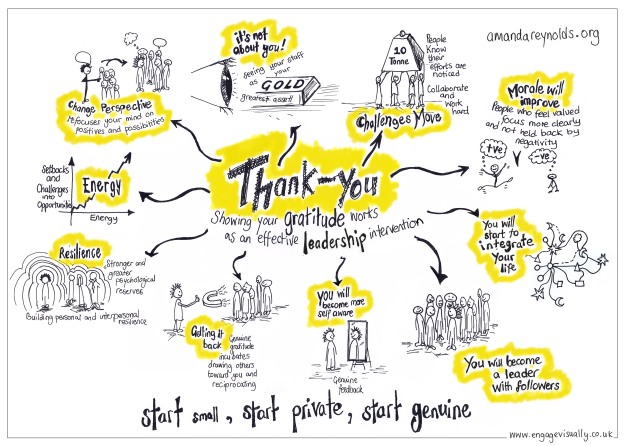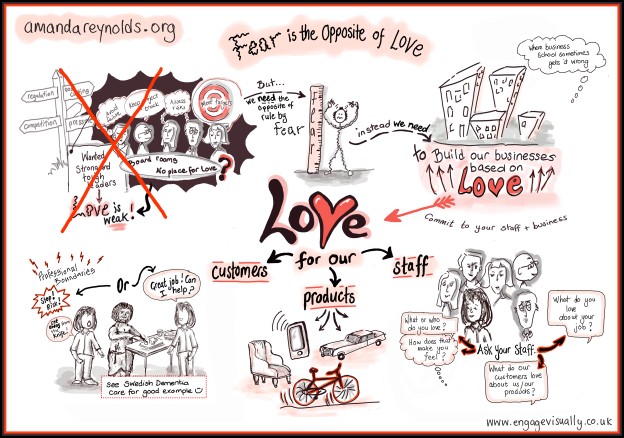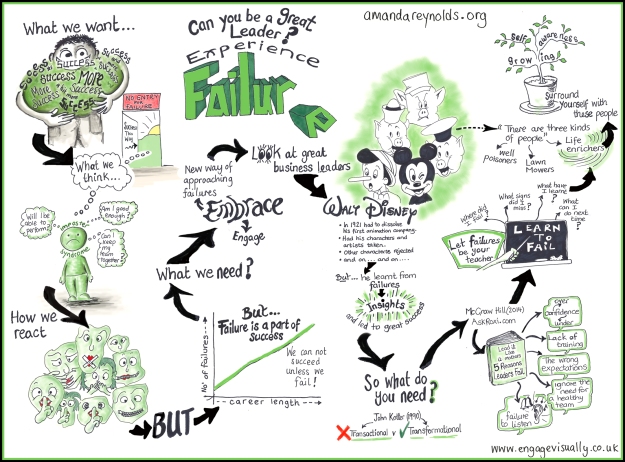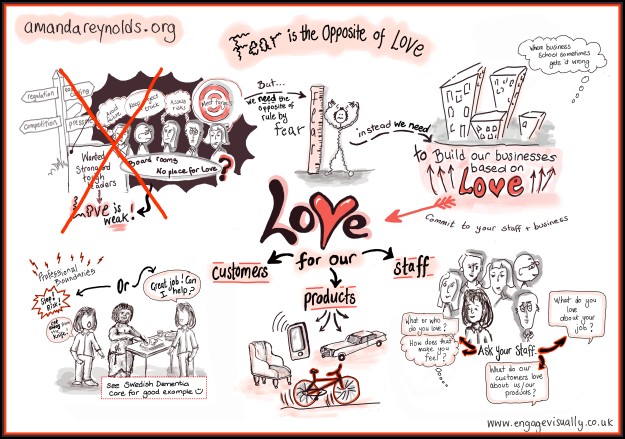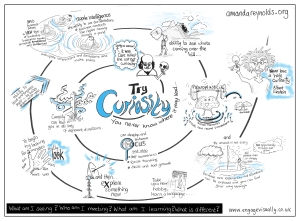Welcome to my blog, one in a series looking at leadership characteristics. Here I draw on my own leadership experience and my work as an executive coach to share with you my thoughts on what makes for a great leader. This blog builds on my earlier blogs and in particular my last blog on LOVE. If you are short on time look at the lovely graphic illustration from @engagevisually
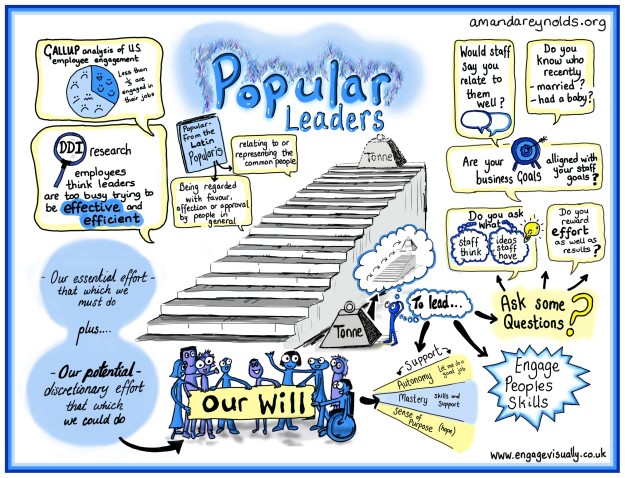
Scott Peck in his book The Road Less Travelled starts with:
“Life is difficult. This is a great truth, one of the greatest truths. It is a great truth because once we truly see this truth, we transcend it. Once we truly know that life is difficult-once we truly understand and accept it-then life is no longer difficult. Because once it is accepted, the fact that life is difficult no longer matters.”
I would add to that “people are difficult”. Many of you know that as a leader you have to work at engaging your workforce and it will not be easy. You need to develop strategies and grow yourself to be an effective leader. My blogs help you consider and develop those skills.
So to add to the themes so far, being popular is an important skill to cultivate. Unless you run a business employing robots then you need to find a way to be more popular with staff. I have wondered about the balance between effectiveness, efficiency and popularity in leadership for a number of years now. I also know it is something those I coach often ponder as they lead teams and face business challenges.
At the beginning of my career a mentor told me to concentrate on being effective not popular. They suggested that if I wanted to be promoted I should not get involved with the staff and the detail of the organisation. I should try instead to remain focused on my/ my team’s targets and deliver the results. This was seen as particularly important if I wanted to be spotted by more senior managers and to progress in my career through the corporate hierarchy.
Surely, I thought if you want to deliver results they are delivered by teams, through others and with others. I think that we have got this wrong and we have in business schools swallowed the efficiency and strategic purpose mantra at the cost of staff engagement and organisational resilience.
To run an organisation effectively you need the motivation and engagement of ALL your staff and most importantly the contribution of their skills and their will. I started to realise that what was needed was a way to engage the discretionary effort of the workforce. That discretionary effort is like fairy dust and when engaged can increase individuals effectiveness dramatically. Staff have to WANT to work with you and if you are a leader then they must WANT TO follow you. Not just follow you in the good times but TRUST YOU to lead them in their/the company’s best interest in tough times also. You cannot be effective and will never be effective in leading change and transforming the business without the will of the staff to work with you. They have to like you enough and so you have to be more popular with them.
Now popular is an interesting word and I don’t mean the sort of popular leader who will not upset the status quo. Nor do I visualise a leader who does not really drive change and definitely not the leader who is nice but is seen by staff as ineffective. We need instead to be popular on a deeper level and this will lead to engaged staff, effectiveness as a leader and success for the business. Popular and efficiency do not have to sit as opposites as they actually balance the best leaders.
So, I am intrigued by the word popular and its root is in the Latin word popularis. Two definitions of the word jump out at me and they are:
“Being regarded with favour, affection or approval by people in general” and
“Relating to or representing the common people”.
Many of us are not in favour with our staff as GALLUP analysis of US Employee Engagement suggests less than a third of workers in Washington DC are engaged in their jobs. Leaders need to make a difference here as I think we have a leadership popularity crisis that is leading to poor staff engagement.
http://www.gallup.com/poll/181289/majority-employees-not-engaged-despite-gains-2014.aspx
I saw some graffiti recently which I thought summed this problem in business up:
“You pretend to give us satisfying work and pretend to pay us a proper wage and so we turn up and pretend to work for you.”
We know what staff want to be effective at work and it’s not more money. Instead they want autonomy – to be left alone to do a good job, they also want mastery thats the skills and support to do that job. They also want a sense of purpose, I would describe this as hope. And you as leaders can help them with all three of these areas. They want great leaders and they tell us they would rather have no leader than a poor one!
DDI did a fabulous and comprehensive study of what employees think of us as leaders and it is not comfortable reading. They think we are so busy trying to be effective and running efficient organisations that we don’t notice them and do not lead them well. So if you want to be effective and efficient then start thinking about being more popular with the aim to engage your staff. You can practise and learn some of these skills and this can start by just understanding what the impact of your current behaviour is having:
If you want to work actively at being more popular cast you mind across your organisation, your people and yourself and the leaders you work with and start to ask some questions:.
- Do your staff regard you and your fellow leaders with affection and approval?
- Would staff say you relate well to them?
- Are you seen as “of the common people” and do you know what interests them?
- Who has had a marriage, a baby, kids go to college, anniversary lately? did you notice it? did you acknowledge it?
- Do you survey your staff on what their aims and goals are for the next year or five years are in work and in life?
- Are your business goals aligned to the staff goals for work and life?
- When you go walk about do you ask staff what are their thoughts on how the business is doing?
- Do you ask them for ideas on how to improve things?
- Do staff tell you they know what’s expected of them from you and their manager?
- Do you reward effort as well as results for the company?
Now spend some time listening to what you hear and reflecting on what it says to you. Be honest and challenge yourself as you ponder the questions above. You will need a great coach to help you sift what you are hearing and to think about what you will do with the data this exercise provides you as a leader.
I can promise you efficiency without the people will fail. I have failed myself when I was in an organisation that caused me to put efficiency and targets above taking people with me. When the organisation hit hard times I was not popular enough to survive the cut backs. I learnt a lesson that a key skill of a leader alongside developing the business strategy is to facilitate cooperation. People NEED to want to be around you.
I think the avoidance of popularity is particularly problematic in women who seek leadership roles. They may fear their feminine side, often seen as “the soft skills”. But these skills are so valuable in leadership as staff like REAL and POPULAR leaders. Though I am a passionate advocate for gender equality in the boardroom I am a realist when it comes to women still being judged harder than men if they appear too ruthless.
There will be many leaders in your organisation and they do not just operate in or around the boardroom. So why not give them a chance to do this development work also. John Quincy Adams said, “If your actions inspire others to dream more, learn more, do more and become more, you are a leader.”
And if you need one more reason to work on and develop the skills of being more popular it is to balance your own ego as a leader. You don’t want to end up like Aesop’s wolf do you?
A Wolf, who was roaming about on the plain when the sun was getting low in the sky, was much impressed by the size of his shadow, and said to himself, “I had no idea I was so big. Fancy my being afraid of a lion! Why, I, not he, ought to be King of the beasts”; and, heedless of danger, he strutted about as if there could be no doubt at all about it. Just then a lion sprang upon him. “Alas,” he cried, “had I not lost sight of the facts, I shouldn’t have been ruined by my fancies.”
Do contact me for executive coaching, mentoring and leadership speaking. I can travel to you or I offer high quality Skype coaching. I might be able to help you become more popular and I would love to work with you on your leadership journey.
